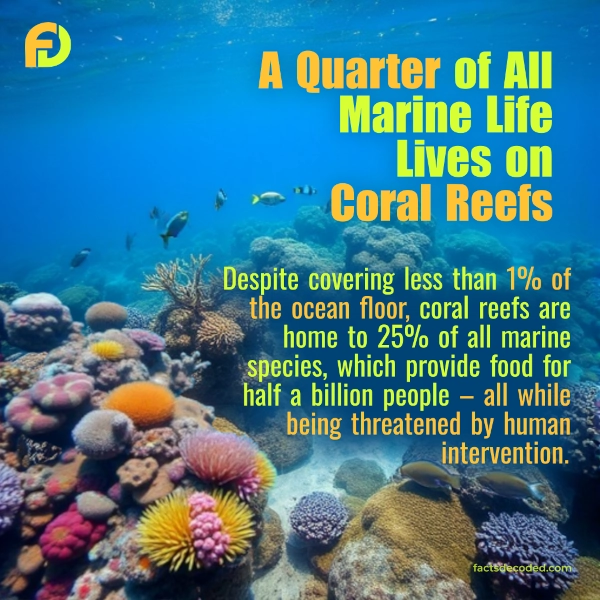
Coral Reefs: A Quarter of Marine Life’s Haven
Despite covering less than 1% of the ocean floor, coral reefs are true powerhouses of biodiversity, supporting a staggering 25% of all marine species. These vibrant ecosystems not only serve as a haven for countless marine organisms but also play a crucial role in the livelihoods of half a billion people worldwide. From sustaining marine life to shielding coastlines, coral reefs are irreplaceable treasures of the underwater world—now facing significant threats due to human activity.
Guardians of the Ocean
Coral reefs are often called the “rainforests of the sea” for their incredible diversity. Beyond their ecological significance, they play a crucial role in human livelihoods. Reefs provide food for over 500 million people, act as natural barriers against coastal erosion, and contribute billions to the global economy through tourism and fisheries. Additionally, coral reefs support crucial scientific research, including the discovery of new medicines derived from reef organisms.
Mounting Threats to Coral Reefs
Despite their importance, coral reefs face dire threats from human activity:
- Climate Change: Rising ocean temperatures cause coral bleaching, weakening reefs and making them vulnerable to disease.
- Pollution: Agricultural runoff, sewage, and plastic waste degrade reef ecosystems.
- Overfishing: Unsustainable practices damage reef habitats and disrupt delicate food chains.
- Coastal Development: Sedimentation from construction smothers coral, preventing sunlight from reaching these vital organisms.
With an estimated 50% of the world’s coral reefs already lost, urgent action is needed to preserve what remains.
Unique Species of Coral Reefs
Coral reefs are home to some of the planet’s most unique and colorful creatures. From clownfish darting among anemones to parrotfish grazing on algae, the diversity is astonishing. Other fascinating species include:
- Sea Turtles: Reefs provide feeding grounds for endangered species like the hawksbill turtle.
- Reef Sharks: Key predators that maintain the balance of reef ecosystems.
- Mantis Shrimp: Known for their incredible speed and vibrant colors, these shrimp are among the most fascinating reef inhabitants.
Fascinating Facts About Coral Reefs
- Corals are animals, not plants.
- Coral reefs cover less than 1% of the ocean floor but support 25% of all marine species.
- They indirectly provide food for 500 million people by supporting marine species that humans consume.
- Coral reefs protect 150,000 km of coastline from erosion and storm damage.
- The Great Barrier Reef in Australia is the largest coral reef system in the world.
- Some coral reefs are over 10,000 years old, making them one of Earth’s most ancient ecosystems.
How You Can Help Protect Coral Reefs
Protecting coral reefs is a shared responsibility. Here are simple steps you can take to minimize harm:
- Never buy coral souvenirs: Removing coral from its natural habitat damages the reef and disrupts marine life.
- Avoid stirring sediment: When snorkeling or diving, be mindful not to disturb the seabed. Sediment can smother coral, preventing it from photosynthesizing.
- Don’t feed the fish: Feeding disrupts the natural balance of reef ecosystems and alters fish behavior.
- Choose reef-safe products: Use eco-friendly shampoos, soaps, and sunscreens when visiting coral-rich areas to avoid introducing harmful chemicals.
Take Action to Protect Coral Reefs
Coral reefs are vital to marine life and human survival, but their future hangs in the balance. Protecting these ecosystems requires global awareness and collective action. Support reef-friendly initiatives, reduce your carbon footprint, and avoid products that harm coral reefs. Explore our “Eco-Explorations“ section to learn more about the world’s incredible ecosystems and how you can help safeguard them for future generations.
What’s your favorite coral reef fact? Share in the comments!
Share this post to raise awareness and inspire action to protect our planet’s underwater treasures. Social media icons are conveniently provided at the bottom for easy sharing.

We choose not to clutter your experience with ads. If you’d like to support us, consider showing some love by liking this post on X (Twitter), Instagram or Facebook!
Share this Post, Spread the Knowledge!

WOW………!!!